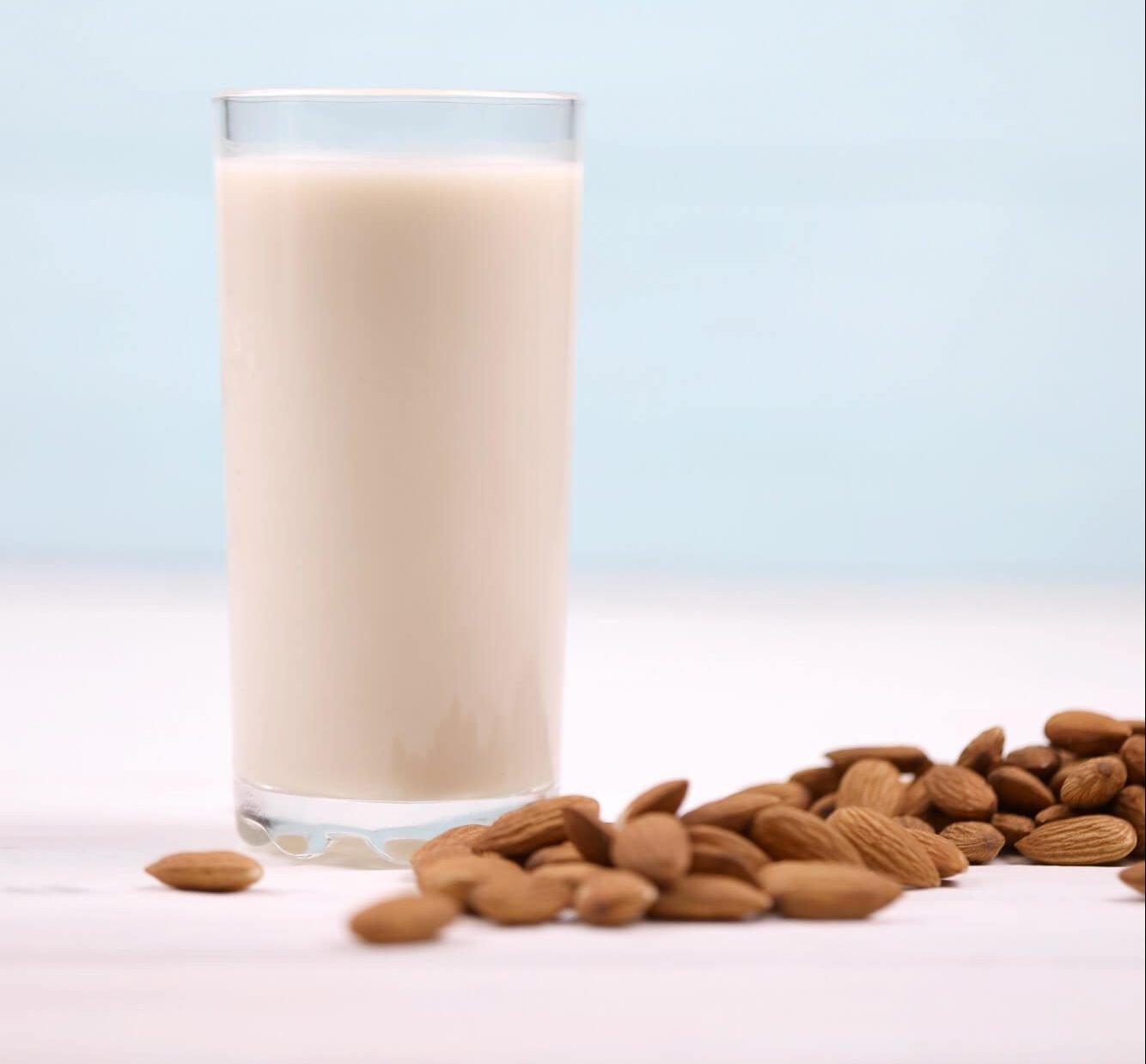Almond milk is the most popular alternative milk on the market.
It offers a wide range of health benefits like reduced sugar intake, increased access to Vitamins E and D, and better weight management.
Despite this beverage’s popularity and healthy reputation, there is a question of whether almond milk is the right choice for growing kids and adolescents or those who want to put on muscle mass or weight as part of their health goals.
When consumed as part of a well-rounded diet, almond milk can help you grow and contribute to your overall health.
Explore how almond milk can help you grow and what to consider when choosing an almond milk brand for various growth and health goals.
What Nutrients are in Almond Milk?
The nutrients in almond milk help determine whether it can help you grow.
Certain nutrients, like protein and calcium, contribute to growing bones and muscles.
Other macronutrients like fat and carbohydrates help you grow mass in your body.
Almond milk has the following nutritional profile:
- Calories: 39 kcal
- Protein: 1 gram
- Fat: 2.5 grams
- Carbohydrates: 3.4 grams
- Vitamin D: 2.6 micrograms, 13% Daily Value (DV)
- Vitamin E: 16.6 milligrams (mg), 111% DV
- Calcium: 482.1mg, 37% DV
It’s important to note that this nutrition profile is typical of a store-bought, fortified brand of almond milk.
Fortified means that manufacturers have added nutrients to the almond milk, likely Vitamin D, Calcium, and Vitamin E.
Other non-fortified almond milk brands don’t offer the same nutrients.
For example, New Barn Organics almond milk contains:
- Calories: 90 kcal
- Protein: 3 grams
- Fat: 8 grams
- Carbohydrates: 1 gram
- Calcium: 16 grams, 16% DV
- Potassium: 6 mg, 0% DV
The difference between the two types of almond milk is the ingredients.
A fortified, store-bought brand usually contains additives like gums, thickeners, emulsifiers, and preservatives.
While these are harmless for most people, some additives like carrageenan can cause digestive issues for those with sensitive systems.
Organic brands like New Barn Organics only contain filtered water, organic almonds, and sea salt.
This reduces its nutritional profile but means you get better quality almond milk when you choose to drink it.
For more information about what's in almond milk and its benefits, check out our Almond Milk 101 video:
Does Almond Milk Help You Grow Taller?
Specific nutrients that help you grow taller and maintain your height include:
- Calcium
- Vitamin D
- Protein
- B vitamins
- Vitamin C
- Magnesium
These nutrients are essential for bone growth.
Calcium is one of the top supporters of bone health. It helps children grow, and older adults maintain bone mass as they age.
Vitamin D helps your body absorb calcium, and magnesium aids both calcium and Vitamin D in doing their job.
Protein helps your body build tissues like cartilage and joints to hold your bones together.
B Vitamins and Vitamin C aid the skeletal system and connective tissues in keeping your bones healthy.
Depending on the nutritional profile of your almond milk, you may miss out on these important nutrients.
While fortified almond milk may contain a good portion of your DV of calcium, non-fortified or homemade almond milk won’t offer the same growth benefits.
Almond milk is typically low in Vitamin D unless it’s fortified and lower in fat and nutrients like B Vitamins.
So while almond milk can contribute to you growing taller, it’s essential to check the nutrition label to judge how you may need to supplement with the rest of your diet.
It’s important to remember that most people stop growing taller once they hit age 20; however, eating the right nutrients can prevent bone loss in some older adults.

Does Almond Milk Help You Grow Muscle Mass?
If you’re looking to grow muscle mass, you must focus on eating enough calories and protein to sustain muscle growth.
Without enough calories, your body can’t support muscle growth, and without enough protein, your body can’t create muscle proteins to bulk up.
Generally, you need 300 to 500 extra calories daily to put on muscle mass.
In terms of protein, you need approximately .72 grams of protein per pound of body weight per day.
You must also eat enough carbs and fats to gain muscle, with most people needing .22 to .68 grams of fat per pound of body weight each day.
So, can almond milk help you grow muscle mass?
While it’s not likely that almond milk will help you reach your muscle mass goals on its own, it can help you support a healthy lifestyle and aid you during a cutting phase of muscle-building.
Almond milk is low in calories, fat, carbs, and protein so it won’t do much in terms of nutrients needed to put on muscle.
However, you can use it as a healthy way to mix protein powders or other supplements without taking in the calories, carbs, and fat content of dairy milk.
Here's a video of a dairy-free, three-ingredient recipe that packs 50+ grams of protein with almond milk and protein powder.
Does Almond Milk Help You Put on Weight?
For some people, gaining weight is a growth goal.
This may happen after a surgical procedure or illness has caused you to lose weight or if you are recovering from disordered eating.
The basic formula for gaining weight is to eat more calories than you burn.
Ideally, you want those calories to come from healthy foods rather than processed junk food full of additives, sugars, and salt.
At between 39 kcal and 90 kcal per cup, almond milk certainly won’t cause you to gain weight on its own.
It also doesn’t contain a high carbohydrate or fat count, making it fairly ineffective at helping you gain weight.
However, you can use almond milk in various cooking and baking recipes as a healthy alternative to dairy milk.
These recipes include cakes, cookies, stews, and sauces, which can help you up your calorie count and put on a few extra pounds.
Almond Milk Vs. Cow's Milk For Growth
When considering almond milk for growth, most people compare it to cow’s milk.
This may be due to a 2017 study published in the American Journal of Clinical Nutrition.
This study found that children who drank milk alternatives like almond milk grew less and measured shorter than those that drank cow’s milk.
The published findings said that the non-dairy milk-drinking children grew .15 inches less for every cup of alternative milk they drank than those who consumed the equivalent in cow’s milk.
While these findings may at first cause alarm, the study didn’t state exactly why these children measured shorter.
In other words, it didn’t state the causation between the correlation of non-dairy milk and shorter height, only that a correlation existed.
It’s possible that the children lacked nutrients typically found in cow’s milk due to a deficit in other areas of their diet.
It’s worth noting, however, that one cup of whole cow’s milk contains:
- Calories: 146 kcal
- Protein: 8 grams
- Fat: 7.81 grams
- Carbohydrates: 11.4 grams
- Vitamin D: 2.68 µg
- Calcium: 300 mg
- Magnesium: 29.3 mg
- Vitamin B-6: .15 mg
- Vitamin B-12: 1.32 µg
- Potassium: 366 mg
- Vitamin A: 78.1 µg
Compared to almond milk, cow’s milk offers a wider range of nutrients needed for bone health and muscle growth.
Especially when compared to homemade almond milk or almond milk made with just almonds, water, and salt, which is extremely low calorie, cow’s milk may be superior for growth.
Related: Almond Milk vs. Cow's Milk
What Should You Do If You’re Worried Almond Milk Will Stunt Your Growth?
If you’re worried about drinking almond milk or giving it to your children because it may stunt their growth, it's important to remember that almond milk is only one factor in your (or your children’s) entire diet.
Almond milk on its own won’t cause you to stop growing or hinder your muscle-building achievements unless you don’t get enough nutrients from other foods.
Almond milk is an excellent addition to a healthy diet and can even help you achieve your nutrient goals regarding low-carb diets like Keto or clean eating like Whole30.
To ensure that you get enough nutrients to achieve the growth you want, focus on including the following foods that will help you grow:
- Dairy products like cheese and yogurt (cottage cheese, in particular, is high in protein)
- Omega-3-rich fish like salmon or sardines
- Cruciferous veggies like broccoli, cauliflower, or bustle sprouts
- Leafy greens like kale, spinach, and bok choy
- Eggs
- Grass-fed beef and poultry
- Bone broth
- Fruits like kiwis, berries, and oranges
- Legumes and beans like peanut butter, chickpeas, and black beans
- Supplements like collagen protein powder

Include Almond Milk As Part of a Well-Rounded Diet
Almond milk is a healthy, nut-based alternative to cow milk.
Although some research points to less growth for children and adolescents who only drink alternative milk like almond milk over traditional dairy milk, consuming almond milk won’t have a detrimental effect on growth unless it is combined with a nutrient-lacking diet.
The bottom line is that as part of a diet with nutritious fruits, veggies, carbs, and other vitamins and nutrients, almond milk can help you sustain a healthy lifestyle and meet your growth goals.
